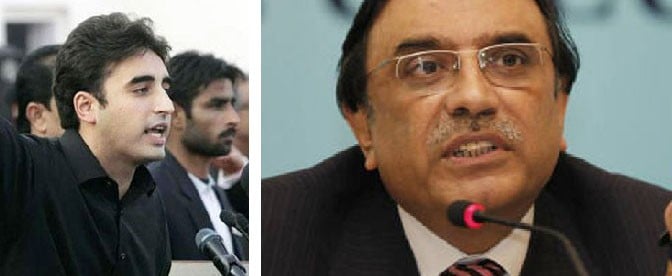
With a history of anti-establishment politics, what was the PPP’s compulsion to join the chorus seems like a valid question

If one decides to be the devil’s advocate, the PPP did not play its cards too badly.
Considering its numerical strength in the Senate, the support of PPP was crucial for the passage of the 21st Constitutional Amendment that allows an amendment in the Army Act to enable the setting up of military courts. Notwithstanding the dissenting voices, tweets and tears of shame, it was rather quick in putting its weight behind the government in forging a consensus on the amendment. Thus, when the time came, there was no stopping the much sought-after ‘unanimous vote’.
With a history of anti-establishment politics, what was the PPP’s compulsion to join the chorus seems like a valid question. Some might suggest that a parliament, which a few months ago asserted itself pretty strongly against the PTI-PAT onslaught, has now signed its own ‘death warrant’, and PPP is complicit in the crime.
But that would be a rather shallow understanding of a party that has been at the receiving end of military dictatorships and its instruments of ‘justice’. The PPP, indeed, has no baggage like the PML-N -- a fondness for speedy justice and special courts. And yet it decided to be a part of the political consensus that emerged in the country in favour of military courts in the aftermath of the December 16 tragedy.
So what could have been the possible reasons for the party to readily support the military courts?
To start with, the PPP has been the worst victim of terrorism, to the extent of losing its top leaders to it. The case of Benazir Bhutto’s assassination is pending in the civil courts for the past five to six years. The party has not received justice for her or for its governor Salmaan Taseer or minister Shahbaz Bhatti, what to talk of the rank and file who lost their lives in incidents of terrorism. Now that the military has decided to curb terrorism with full might, the party may have found it not too difficult to support it -- for the simple reason that the civilian courts failed the party on more than one count. There is a sense of pent up anger against the judiciary, at least in the party’s top leadership.
Of course, the PPP subscribes to the view that the terrorism problem in this country owes itself to the military’s distorted foreign policy objectives in the past. Now that the military was pressing for the setting up of military courts, on the level of pure realpolitik, this was the best time to at least not oppose them. In an emerging political scenario, where all other parties would have stood for a consensus against terrorism, the PPP did not want to be left out alone.
If the amendment did not come through and there still were terrorist incidents, it would have had to share the blame for opposing a ‘crucial’ move at a crucial time.
The party does not honestly care for the slogans of ‘civilian supremacy’ and ‘civilian authority’ raised by political idealists. It has been in power for five years only recently and knows these slogans for their hollowness. While it tried to lay the structural foundations of a democratic dispensation, it did experience their futility at the time of Kerry Lugar Bill and ‘Memogate case’.
So, if the terrorism problem does not get solved in the next six months or a year, the PPP, together with PML-N and others who have supported the consensus, could ask the army for ‘results’ because they conceded to the army’s suggested solution.
They could score a further point with the army by telling it that its own political supporters (JUI and JI) did not join the consensus while they did.
Some people are reading too much in the Bilawal Bhutto tweet about the parliament cutting off its nose to spite its face on the day of the vote. They think this was an attempt to take away any sanctity attached with the consensus, just as Raza Rabbani’s speech in the Senate or Aitzaz Ahsan’s statement did, and hint at a division within the party. But this, too, has been good for the democratic credentials of the party compared to say the PML-N where not a word of opposition was uttered.
As for division within the party Asif Ali Zardari has once again prevailed as the only leader. His opinion is also given weight as the former president. Like a smart politician, Zardari has played within the system. Besides, it is not the first time the PPP has done politics by ‘dealing’ with the army. From Benazir Bhutto’s arrival in Lahore in 1986 to her second coming in 2007, the party has had to deal with the permanent wielders of power many a time.
However, having played the devil’s advocate, it is important to state that the military courts will have consequences for the polity, for the civilian justice system, for the parliament and for the political class, and not necessarily for terrorism. Inside the court rooms, the norms of fair trial will be compromised and standards of evidence lowered.
Perhaps the PPP plans to deal with these consequences when the time comes.